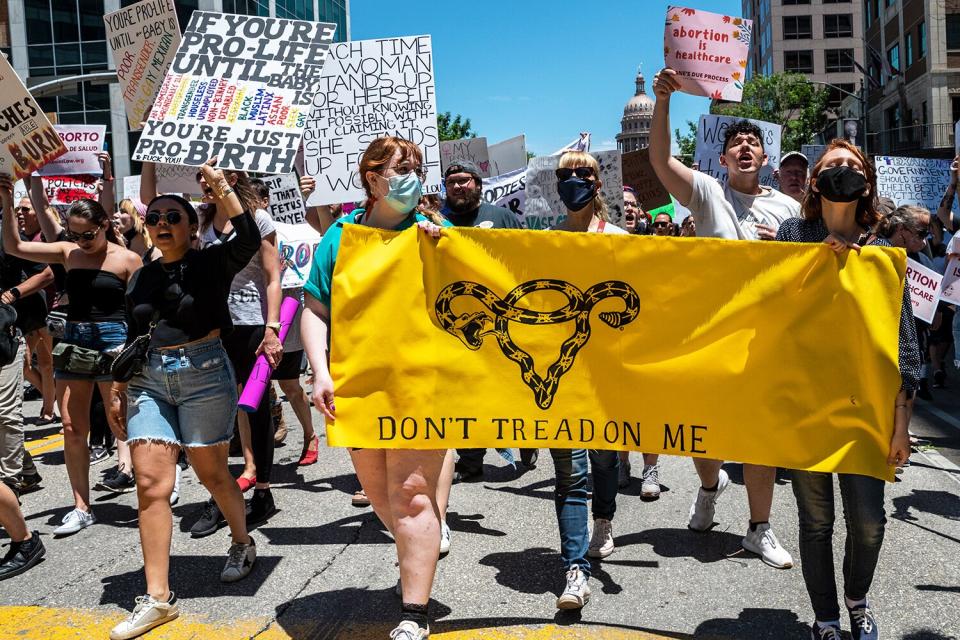Federal Judge Orders Texas to Suspend Enforcement of Abortion Law
- Oops!Something went wrong.Please try again later.
A federal judge has temporarily banned enforcement of Texas' restrictive Senate Bill 8.
On Wednesday, U.S. District Judge Robert Pitman granted a preliminary injunction to suspend enforcement of the abortion ban, after the Justice Department argued that Senate Bill 8 was created "to prevent women from exercising their constitutional rights."
The order blocks the state from enforcing the law in any capacity, including barring judges and court clerks from hearing or administering lawsuits brought against individuals who seek abortions or abortion providers under Senate Bill 8.
"Fully aware that depriving its citizens of this right [to an abortion] by direct state action would be flagrantly unconstitutional, the State contrived an unprecedented and transparent statutory scheme to do just that," Pitman wrote in his opinion.
For more on the Texas abortion ban getting blocked and other top stories, listen below to our daily podcast PEOPLE Every Day.
He added, "From the moment S.B. 8 went into effect, women have been unlawfully prevented from exercising control over their lives in ways that are protected by the Constitution. That other courts may find a way to avoid this conclusion is theirs to decide; this Court will not sanction one more day of this offensive deprivation of such an important right."

Sergio Flores For The Washington Post via Getty Pro-choice protesters march outside the Texas State Capitol on Wednesday, Sept. 1, in Austin, Texas.
RELATED: Doctor Who Performed Abortion Being Sued in Order to Challenge Controversial Texas Law in Court
White House Press Secretary Jen Psaki said in a statement on Wednesday that the ruling "is an important step forward toward restoring the constitutional rights of women across the state of Texas."
Psaki added, "S.B. 8 not only blatantly violates the right to safe and legal abortion established under Roe v. Wade, but it creates a scheme to allow private citizens to interfere with that right and to evade judicial review. The fight has only just begun, both in Texas and in many states across this country where women's rights are currently under attack. That's why the President supports codifying Roe v. Wade, why he has directed a whole-of-government response to S.B. 8, and why he will continue to stand side-by-side with women across the country to protect their constitutional rights."
Texas first passed Senate Bill 8 — described by Planned Parenthood as "one of the most extreme abortion bans in the U.S." — Sept. 1. The bill bans abortions after six weeks, making no exceptions even in cases of rape, sexual abuse, incest or fetal anomalies.
The law also rewards a minimum of $10,000 to private citizens who successfully sue abortion providers. Anyone who aids in an individual securing an abortion — including those driving the patient to a clinic or helping to cover the cost — can also be sued.
After the Supreme Court declined to block the law in a 5-4 vote, the Justice Department sued Texas over the law Sept. 9.
Want to get the biggest stories from PEOPLE every weekday? Subscribe to our new podcast, PEOPLE Every Day, to get the essential celebrity, entertainment and human interest news stories Monday through Friday.
"The act is clearly unconstitutional under long-standing Supreme Court precedent," Attorney General Merrick Garland said at a news conference announcing the lawsuit, per The Associated Press.
Last month, abortion rights activist Anna Rupani from Fund Texas Choice said on the PEOPLE Every Day podcast that she fears the entire country could be impacted by the new restrictions.

Sergio Flores/Getty
RELATED: Texas Abortion Rights Advocate Warns Restrictive Laws Will 'Impact the Entire Nation'
"We're hearing that other states want to see how long this plays out, and can they create just as restrictive laws in their own states," she explained.
While abortion care may be easily accessible for most women in states like New York, Rupani questioned, "will it be easy to access if other states outside of Texas start banning abortion?"
Never miss a story — sign up for PEOPLE's free weekly newsletter to get the biggest news of the week delivered to your inbox every Friday.
"I think in Oklahoma, for the last three weeks, most of the patients at a couple of Oklahoma clinics have only been Texans. So that means you're forcing Oklahomans out of their state, unfortunately, because that's the first place Texans are going to get care," she said. "And this is just going to create a chilling and trickle-down effect of where folks are going."

